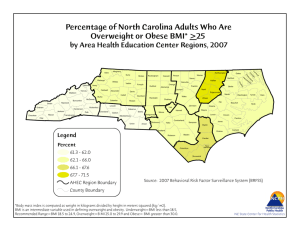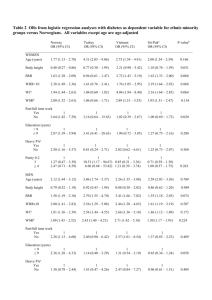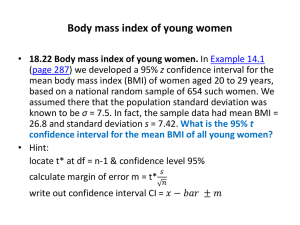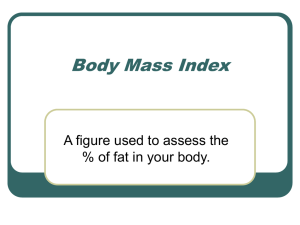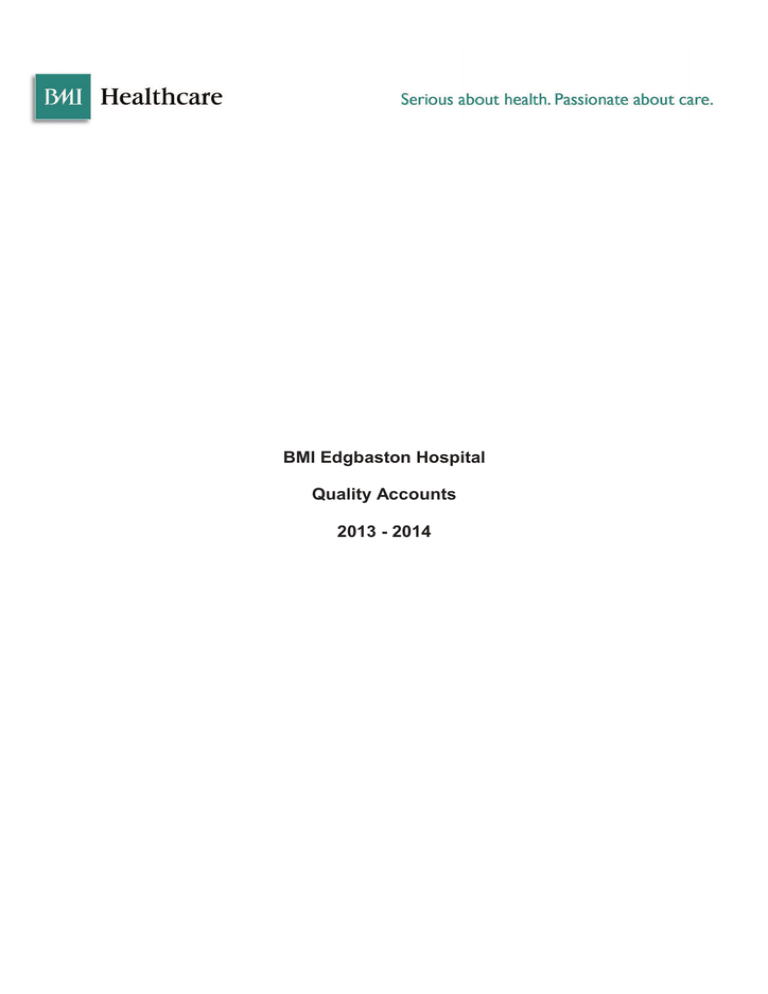
BMI Edgbaston Hospital
Quality Accounts
2013 - 2014
BMI Edgbaston Hospital Quality Accounts
April 2013 to March 2014
Table of Contents
-
Chief Executive Statement
-
- Hospital Summary - Including details about the Hospital
-
Services and treatments offered
-
Care Quality Commission Inspection
-
Details of Clinical and Governance Groups
1. Safety
1.1 Infection prevention and control
1.2 Patient Led Assessment of the Care Enviroment (PLACE)
1.3 Venous Thrombo-embolism (VTE)
2. Effectiveness
2.1 Patient reported Outcomes (PROMS)
2.2 Enhanced Recover programme
2.3 Unplanned Readmissions within 31 days and unplanned returns to theatre
3. Patient experience
3.1 Patient satisfaction
3.2 Complaints
4
CQUINS
5
National Clinical Audits
6
Research
7
Priorities for Service Development + improvement
8
Mandatory Quality Indicators
9
Non Mandatory Quality Indicators
10 Statement from Commissioner
11 Glossary
Chief Executive’s Statement
Welcome to our Quality Accounts 2014, the fifth year we have
published this data. The information presented here on a broad
range of quality measures continues to grow in importance and
usefulness for patients and commissioners. Quality accounts
already provide a key metric for people to assess the strength of our
66 hospitals and clinics against other facilities - NHS and
independent - from which they might receive their care.
For BMI Healthcare and every other private provider the importance
of comparable quality data was recently reinforced by the
conclusions of the Competition Commission’s market investigation
into private healthcare. From the outset of the inquiry BMI
Healthcare supported the principle that competition in the sector
would be enhanced if private hospitals produced comparable quality data, and that competition
amongst hospitals would drive up service standards. We were therefore fully supportive when
the Commission announced in April that it is mandating the provision of greater information on
the performance of hospital operators and consultants. We wholeheartedly agree when the
Commission says that “a more transparent market with patients actively making choices will
drive hospital operators to compete on the things that matter to patients”.
Whilst we are yet to see how the Commission will ensure that this is enacted, the private sector
continues to take its own steps. Five years ago BMI Healthcare was at the forefront of the
sector’s efforts to be more open about sharing comparable quality and pricing data when we
sponsored the launch of the Hellenic Project. Today that work has been superseded by the
Private Hospitals Information Network which is working towards publishing data that will allow
patients and commissioners to make informed choices - a challenge that the sector must now
rise to. We at BMI Healthcare will continue to play our part in these important developments,
which we believe can have a significant role in driving higher quality standards.
I remain proud, but certainly not complacent, about the quality of care our hospitals provide.
Last year BMI Healthcare invested £40m in our hospitals, supporting our committed staff and
consultants to meet the challenge of providing consistently safe, high quality care. We
constantly measure our patients’ experience, and I am pleased to note that in the three months
to the end of March 2014, 97.3% of patients independently surveyed expressed satisfaction with
their care and 97.9% said they would recommend us to others. There is however always room
for improvement, and publication of comparable quality data across the independent sector can
only help.
The information available in these quality accounts has been reviewed by the Clinical
Governance Board and I declare that as far as I am aware the information contained in these
reports is accurate. I thank all the staff whose energy and devotion to improvement is
represented here and, more importantly, in the experiences of every patient who steps across
our threshold.
Stephen Collier
Chief Executive Officer
BMI The Edgbaston hospital is part of BMI Healthcare, Britain's leading provider of independent
healthcare with a nationwide network of hospitals & clinics performing more complex surgery
than any other private healthcare provider in the country. Our commitment is to quality and
value, providing facilities for advanced surgical procedures together with friendly, professional
care.
BMI The Edgbaston Hospital has 55 beds including 2 HDU with all rooms offering the privacy
and comfort of en-suite facilities, satellite TV and telephone. The hospital has three theatres and
a minor operations/endoscopy suite.
The modern and spacious endoscopy suite serves patients with a wide range of endoscopic
procedures, many of which will be carried out as a walk-in, walk-out service. The leading-edge
suite is fitted with the very latest in endoscopic technology and this enables top quality highdefinition images to be captured.
These facilities combined with the latest in technology and on-site support services, enable our
consultants to undertake a wide range of procedures from routine investigations to surgery.
This specialist expertise is supported by caring and professional medical staff, with dedicated
nursing teams and Resident Medical Officers on duty 24 hours a day, providing care within a
friendly and comfortable environment.
The Edgbaston Hospital offers the following:•
•
•
•
•
Access to all specialties from Orthopaedics to Dermatology
A High Dependency Unit
Dedicated ENT treatment room
Audiology
Endoscopy + Minor operations Suite
•
•
•
•
•
•
Choose & Book Clinics offering patient choice to NHS Patients
Physiotherapy
Xray/Ultrasound + CT
Cosmetic Surgery
Weight loss surgery
Chiropody + Podiatry
Edgbaston Hospital works closely with supporting local NHS Trusts and offers Patient Choice
for selected clinics via Choose and Book, NHS works equates to 56.5% of the overall work .
Edgbaston Hospital also works closely with BMI off site facilities at Heath Lodge in Knowle,
Solihull and Ahfurlong Medical Centre in Sutton Coldfield. Both these facilities offer an out
patient facility and basic diagnostic facilities.
Choose and book clinics offered to NHS patients include Gastroenterology, Hip, Knee, hernia
and gynaecology clinics to name but a few.
BMI Healthcare are registered as a provider with the Care Quality Commission (CQC) under the
Health & Social Care Act 2008. BMI Edgbaston Hospital is registered as a location for the
following regulated services:•
•
•
Treatment of disease, disorder and injury
Surgical procedures
Diagnostic and screening
The CQC carried out an unannounced inspection on the 6th February 2014 and found that we
met all standards.
Standards of treating people with respect and involving them in their
care
Standards of providing care, treatment & support which meets people's
needs
Standards of caring for people safely & protecting them from harm
Standards of staffing
Standards of management
Edgbaston Hospital has a local framework through which clinical effectiveness, clinical incidents
and clinical quality is monitored and analysed. Where appropriate, action is taken to
continuously improve the quality of care. This is through the work of a multidisciplinary group
and the Medical Advisory Committee.
Regional Clinical Quality Groups monitor and analyse trends and ensure that the quality
improvements are operationalised.
At corporate level the Clinical Governance Board has an overview and provides the strategic
leadership for corporate learning and quality improvement.
There has been ongoing focus on robust reporting of all incidents, near misses and outcomes.
Data quality has been improved by ongoing training and database improvements. New reporting
modules have increased the speed at which reports are available and the range of fields for
analysis. This ensures the availability of information for effective clinical governance with
implementation of appropriate actions to prevent recurrences in order to improve quality and
safety for patients, visitors and staff.
There are external reporting requirements for CQC, Public Health England (Previously HPA)
CCGs and Insurers. There has also been ongoing progress on the project to collect and publish
comparative data to assist patients and referrers with their choices on healthcare facility. This
has started with the launch of an independent Private Healthcare Information Network website
http://www.phin.org.uk This provides information on facilities, numbers of a variety of
procedures carried out at each site and some basic quality indicators. The range of the available
indicators will continue to grow for ongoing enhancement of choice.
1 Safety
1.1 Infection prevention and control
The focus on infection prevention and control continues under the leadership of the Group Head
of Infection Prevention and Control, in liaison with the link nurse in BMI Edgbaston Hospital.
The focus on infection prevention and control continues under
the leadership of the Group Director of Infection Prevention and
Control and Group Head of Infection Prevention and Control, in
liaison with the Infection Prevention and Control Lead BMI
Edgbaston Hospital.
We have had: •
•
•
•
Zero cases of MRSA bacteraemia in the last year (NHS
1.17cases/100,000 bed days).
Zero MSSA bacteraemia cases /100,000 bed days
Zero E.coli bacteraemia cases/ 100,000 bed days
Zero cases of hospital apportioned Clostridium difficile in the last 12 months.
SSI data is also collected and submitted to Public Health England for Orthopaedic surgical
procedures. Our rates of infection are;
•
•
0% for Hips
0% for Knees
Infection Prevention and Control (IPC) environmental and clinical practice audits are carried out
within all departments of the hospital according to an annual audit schedule devised by the IPC
team. These are performed using the Infection Prevention Society’s (IPS) Quality Improvement
Tools (QIT).
QIT audit results are reviewed by the IPC team and areas of concern are re-visited at more
regular intervals with action plans being devised for desired improvements.
Challenges presented by the general hospital environment throughout the QIT audits have now
been addressed by a ward by ward refurbishment. The refurbishment incorporated extensive
local involvement by the IPC team from the planning stage to completion of the first phase
ensuring clinical environments fit for purpose.
High Impact Intervention (HII) care bundles for peripheral cannulas, urinary catheters, and
Surgical Site Infection (SSI) were introduced by the IPC team in January 2012 with an
expansion to include Central Venous Catheter, Ventilator bundles during 2013.
These audits are carried out quarterly by the IPC Team to maintain clinical standards alongside
National benchmarks. All staff are made aware of the importance of these bundles, their impact
on clinical practice and the importance of accurate documentation for audit purposes.
during annual mandatory training.
Care Bundle audit results 2013 -
Urinary Catheters
Insertion:
Ongoing care:
100%
100%
Insertion:
Ongoing care:
29%
61%
SSI (Intraoperative)
Intra-operative
85%
CVAD (Critical Care)
Insertion
Ongoing Care
100%
100%
Peripheral Cannula
(average of all wards
and departments)
Ventilator (Critical Care)
100%
Appropriate documentation is being devised corporately to incorporate these specific audit tools
as the audit results for the most commonly carried out invasive procedure (Venous cannulation)
is misrepresented due to the inappropriateness of the currently available documentation.
All clinical staff attend annual mandatory training which incorporates hand hygiene training and
competencies, Aseptic Non-Touch Technique training and competencies, Care bundles and
High Impact Intervention awareness. The mandatory training sessions also involve changes in
IPC guidelines, discussions related to IPC practices. Recently introduced is a session
addressing Sepsis awareness/recognition and management for all clinical staff.
In addition to the QIT audit schedule regular hand hygiene audits are undertaken in the clinical
areas to ensure staff are decontaminating their hand within the clinical area at appropriate
times.
IPC continues to support, educate and facilitate improvements within the clinical environment
and in maintaining and improving staff performance and patient safety.
Environmental cleanliness is also an important factor in infection prevention and our patients
rate the cleanliness of our facilities highly.
1.2 Patient Led Assessment of the Care Environment (PLACE)
We believe a patient should be cared for with compassion and dignity in a clean, safe
environment. Where standards fall short, they should be able to draw it to the attention of
managers and hold the service to account. PLACE assessments will provide motivation for
improvement by providing a clear message, directly from patients, about how the environment
or services might be enhanced.
In 2013 we introduced PLACE, which is the new system for assessing the quality of the patient
environment, replacing the old Patient Environment Action Team (PEAT) inspections.
The assessments involve patients and staff who assess the hospital and how the environment
supports patient’s privacy and dignity, food, cleanliness and general building maintenance. It
focuses entirely on the care environment and does not cover clinical care provision or how well
staff are doing their job.
The results will show how hospitals are performing nationally and locally.
The PLACE audit for 2013 remains on a live information site and therefore individual comments
and recommendations are not delivered to the IPC team. The IPC, catering and housekeeping
teams work closely together to fulfil the requirements of the PLACE audit on an annual basis.
A majority of patient representative comments involve signage and external road markings,
disabled parking bays etc. The hospital buildings and grounds have been revisited with
improvements being made in signage and a more appropriate siting of the disabled parking
spaces.
Positive feedback was given by the patient representatives regarding the housekeeping,
cleanliness, friendliness and approachability of all staff. Catering and servery staff received high
recommendations and praise for their flexibility and quality of food provided.
1.3 Venous Thrombo-embolism (VTE)
BMI Healthcare, holds VTE Exemplar Centre status by the Department of Health across its
whole network of hospitals including, BMI Edgbaston Hospital. BMI Healthcare was awarded the
Best VTE Education Initiative Award category by Lifeblood in February 2013 and were the
Runners up in the Best VTE Patient Information category.
We see this as an important initiative to further assure patient safety and care. We audit our
compliance with our requirement to VTE risk assessment every patient who is admitted to our
facility and the results of our audit on this has shown 100% compliance.
BMI Edgbaston Hospital reports the incidence of Venous Thromboembolism (VTE) through the
corporate clinical incident system. It is acknowledged that the challenge is receiving information
for patients who may return to their GPs or other hospitals for diagnosis and/or treatment of VTE
post discharge from the Hospital. As such we may not be made aware of them. We continue to
work with our Consultants and referrers in order to ensure that we have as much data as
possible. At BMI Edgbaston Hospital one Orthopedic consultant scans all joint replacement
patients for deep veined thrombosis even if asymptomatic and this results in higher detection
rates.
sd;ZĂƚĞƉĞƌϭϬϬĂĚŵŝƐƐŝŽŶƐͿ
Ϭ͘ϮϱϬ
Ϭ͘ϮϬϱϯ
Ϭ͘ϮϬϬ
ϮϬϬϵ
Ϭ͘ϭϱϬ
ϮϬϭϬ
ϮϬϭϭ
Ϭ͘Ϭϵϵϰ
Ϭ͘ϭϬϬ
ϮϬϭϮ
ϮϬϭϯ
Ϭ͘ϬϱϬ
Ϭ͘ϬϬϬϬ
Ϭ͘ϬϬϬϬ
Ϭ͘ϬϬϬϬ
ϮϬϬϵ
ϮϬϭϬ
ϮϬϭϭ
ϮϬϭϰ
Ϭ͘ϬϬϬϬ
ϮϬϭϰ
ϮϬϭϯ
ϮϬϭϮ
Ϭ͘ϬϬϬ
W;ZĂƚĞƉĞƌϭϬϬĂĚŵŝƐƐŝŽŶƐͿ
Ϭ͘Ϭϲϲϯ
Ϭ͘ϬϳϬ
Ϭ͘ϬϲϬ
Ϭ͘Ϭϱϴϱ
Ϭ͘Ϭϱϰϳ
Ϭ͘ϬϱϬ
ϮϬϬϵ
Ϭ͘ϬϰϬ
ϮϬϭϬ
ϮϬϭϭ
Ϭ͘ϬϯϬ
ϮϬϭϮ
Ϭ͘ϬϮϬ
ϮϬϭϯ
ϮϬϭϰ
Ϭ͘ϬϬϬϬ
Ϭ͘ϬϬϬϬ
ϮϬϭϰ
Ϭ͘ϬϬϬϬ
ϮϬϭϯ
Ϭ͘ϬϭϬ
ϮϬϭϮ
ϮϬϭϭ
ϮϬϭϬ
ϮϬϬϵ
Ϭ͘ϬϬϬ
2 Effectiveness
2.1 Patient reported Outcomes (PROMS)
Patient Reported Outcome Measures (PROMs) are a means of collecting information on the
effectiveness of care delivered to NHS patients as perceived by the patients themselves.
PROMs is a Department of Health led programme.
For the current reporting period, the tables below demonstrate that the health gain between
Questionnaire 1 (pre-operative) and Questionnaire 2 (post–operative) for patients undergoing
hip replacement and knee replacement at BMI Edgbaston Hospital.
Oxford Hip Score average
2013/14
Q1
Q2
Health gain (Q2 - Q1 average)
BMI
ϭϴ͘ϴϭϴ ϯϵ͘ϮϰϮ
ϮϬ͘ϰϮϰ
Edgbaston
Hospital
17.907 39.224 21.317
England
Copyright © 2011 Re-used with the permission of The Health and Social Care Information
Centre. All rights reserved.'
Oxford Knee Score average
2013/2014
Q1
Q2
Health gain (Q2 - Q1 average)
BMI
ϭϴ͘ϯϭϰ ϯϳ͘ϱϭϰ
ϭϵ͘Ϯ
Edgbaston
Hospital
18.893 34.902 16.01
England
Copyright © 2013, The Health and Social Care Information Centre. All Rights Reserved.
2.2 Enhanced Recovery Programme (ERP)
The ERP is about improving patient outcomes and speeding up a patient’s recovery after
surgery. ERP focuses on making sure patients are active participants in their own recovery and
always receive evidence based care at the right time. It is often referred to as rapid recovery, is
a new, evidence-based model of care that creates fitter patients who recover faster from major
surgery. It is the modern way for treating patients where day surgery is not appropriate.
ERP is based on the following principles:All Patients are on a pathway of care
Following best practice models of evidenced based care
Reduced length of stay
Patient Preparation
• Pre Admission assessment undertaken
• Group Education sessions
• Optimizing the patient prior to admission – i.e HB optimisation, control co-morbidities,
medication assessment – stopping medication plan.
• Commencement of discharge planning
Proactive patient management
• Maintaining good pre-operative hydration
• Minimising the risk of post-operative nausea and vomiting
• Maintaining normothermia pre and post operatively
• Early mobilisation
Encouraging patients have an active role in their recovery
• Participate in the decision making process prior to surgery
• Education of patient and family
• Setting own goals daily
• Participate in their discharge planning
Local progress with implementation as follows;
•
•
•
Patient teaching and information on carbohydrate loading is in place
One stop outpatient and pre-assessment clinics currently being done
Looking to expand service to include arthroscopy day case patients
•
•
•
•
•
•
Increased numbers of telephone pre-assessment
Joint physio and pre-assessment clinics
Information regarding pathway being given at pre-assessment
Multidisciplinary Team working together to optimize early discharge
Using principals of ERP across all departments at Edgbaston Hospital
Post discharge calls to all patients
2.3 Unplanned Readmissions within 31 days and unplanned returns to theatre.
Unplanned readmissions and unplanned returns to theatre are normally due to a clinical
complication related to the original surgery.
hŶƉůĂŶŶĞĚZĞĂĚŵŝƐƐŝŽŶǁŝƚŚŝŶϯϭĚĂLJƐ;ZĂƚĞ
ƉĞƌϭϬϬŝƐĐŚĂƌŐĞƐͿ
Ϭ͘ϱϬϬ
Ϭ͘ϰϱϬ
Ϭ͘ϰϯϳϰ
Ϭ͘ϰϬϬ
Ϭ͘ϯϱϬ
ϮϬϬϵ
Ϭ͘ϯϬϬ
ϮϬϭϬ
Ϭ͘ϮϱϬ
ϮϬϭϭ
Ϭ͘ϭϳϵϭ
Ϭ͘ϮϬϬ
Ϭ͘ϭϱϬ
Ϭ͘ϭϬϮϱ
Ϭ͘ϭϬϬ
Ϭ͘ϭϳϭϭ
Ϭ͘Ϭϵϵϰ
ϮϬϭϯ
Ϭ͘Ϭϱϴϱ
ϮϬϭϰ
Ϭ͘ϬϱϬ
ϮϬϭϰ
ϮϬϭϯ
ϮϬϭϮ
ϮϬϭϭ
ϮϬϭϬ
ϮϬϬϵ
Ϭ͘ϬϬϬ
ϮϬϭϮ
hŶƉůĂŶŶĞĚƌĞƚƵƌŶƚŽƚŚĞĂƚƌĞ;ZĂƚĞƉĞƌϭϬϬ
dŚĞĂƚƌĞĂƐĞƐͿ
Ϭ͘ϮϱϬ
Ϭ͘ϮϮϱϭ
Ϭ͘ϭϵϵϮ
Ϭ͘ϮϬϬ
Ϭ͘ϭϳϭϬ
Ϭ͘ϭϳϵϱ
ϮϬϬϵ
ϮϬϭϬ
Ϭ͘ϭϱϬ
Ϭ͘ϭϭϳϮ
ϮϬϭϭ
Ϭ͘ϭϬϯϴ
Ϭ͘ϭϬϬ
ϮϬϭϮ
ϮϬϭϯ
Ϭ͘ϬϱϬ
ϮϬϭϰ
ϮϬϭϰ
ϮϬϭϯ
ϮϬϭϮ
ϮϬϭϭ
ϮϬϭϬ
ϮϬϬϵ
Ϭ͘ϬϬϬ
This data is tracked monthly and scrutinized by the Director of Nursing to look for trends or any
concerns. The data is fed back through the Integrated Governance Committee and Medical
Advisory Committee.
Unplanned re-admissions are usually as a result of a clinical complication related to the original
surgery.
All unplanned returns to theatre are looked at in detail to ensure there are no clinical concerns.
3 Patient experience
3.1 Patient satisfaction
BMI Healthcare is committed to providing the highest levels of quality of care to all of our
patients. We continually monitor how we are performing by asking patients to complete a patient
satisfaction questionnaire. Patient satisfaction surveys are administered by an independent third
party.
.
3.2 Complaints
In addition to providing all patients with an opportunity to complete a satisfaction survey BMI
Edgbaston Hospital actively encourages feedback both informally and formally. Patients are
supported through a robust complaints procedure, operated over three stages:
Stage 1: Hospital resolution
Stage 2: Corporate resolution
Stage 3: Patients can refer their complaint to independent adjudication if they are not satisfied
with the outcome at the other 2 stages.
There has been a s growth in complaints regarding financial issues and insurance queries, the
financial systems in place and Consultant fees. Work continues with our central patient finance
teams (BBS) by staff investigating complaints and feedback on patient experience i.e.
communication to improve the service. It is however pleasing to report that complaints against
hospital care delivery remains low
4 CQUINS
As the CQUIN year for this contract is out of sync with the national timetable the results for the
full year are not yet available. Below is a table showing the achieved half year performance and
the estimated full year performance
CQUIN Group
Half Year Projected
Performan End
of
ce
Year
Performan
ce
Friends
and
Family FFT Implementation: achieving full 100%
100%
Expansion
implementation / phased expansion in
line with national milestones (Y/N)
Friends
and
Family FFT Response Rate
100%
100%
increased response rate
Safety Thermometer
Safety Thermometer survey data for 100%
100%
all appropriate patients, in all
appropriate settings for relevant
CQUIN Description
measures submitted
VTE Risk Assessment
% of all adult inpatients who have had 100%
a VTE risk assessment on admission
to hospital using the clinical criteria of
the national tool
VTE
Route
Cause % of root cause analyses carried out 100%
Analysis
on cases of hospital associated
thrombosis
Surgical Care Bundle To increase best practice use of 100%
Audits
–
Catheters: catheters
Completion of Monthly
Audits
Post-Surgical
Remote To record and increase post-surgical 100%
Follow Up: Completion of telephone follow-ups.
Monthly Audits
Lifestyle
Interventions: To capture BMI and risk assess for 50%
Identification of patients weight associated health issues.
with BMI >30
Lifestyle
Interventions: To capture signpost and offer advice 50%
Patients with BMI >30 to make lifestyle changes to patients
offered
advice
and with BMI >30
signposted to appropriate
services
Creating a Climate of Creating a climate of Quality and 100%
Quality
and
Patient Patient Safety through a focus on the
Safety
patient
safety
culture
of
the
organisation/team or staff group
100%
100%
100%
100%
65%
65%
100%
5 National Clinical Audits
BMI Edgbaston Hospital was only eligible to participate in National Joint Registry audit and all
joint replacements are submitted to this. BMI hospital data is from page 196 onwards in the
latest NJS report - http://www.njrcentre.org.uk/njrcentre/default.aspx.
6 Research
No NHS patients were recruited to take part in research.
7 Priorities for service development and improvement in 2014/15
•
•
Appointment and retention of high quality staff
Improvement of Hospital Literature to suit a wider diverse patient population
•
•
Hospital refresh programme to improve the Hospital Environment for all patient users
Ongoing engagement with NHS commissioners to enhance patient choice and service
delivery to NHS patients
8 Mandatory Quality Indicators
8.1 The value and banding of the summary hospital-level mortality indicator (SHMI) for the
(name of hospital) for the reporting period.
Unit
N/A
Reporting Periods
(at least last
reporting periods)
Oct 11 – Jun 13
National
two Average
1.0006
Highest
Score
National Lowest
Score
1.1822
National
0.6735
The BMI Edgbaston Hospital cannot report on this as the HSCIC data does not contain the
independent sector for this
8.2 The BMI Edgbaston Hospital patient reported outcome measures scores for
Groin hernia surgery
Unit
0.88
Reporting Periods
(at least last
reporting periods)
Apr 12 – Mar 13
National
two Average
0.083
Highest
Score
National Lowest
Score
0.157
National
0.014
The BMI Edgbaston Hospital considers that this data is as described.
The BMI Edgbaston Hospital has taken the following actions to improve this score, and so the
quality of its services by:
•
Advising patients that moderate activity is beneficial and it is important that they continue
to undertake all activities of daily living.
•
Advising patients that it is important they continue with physiotherapy following surgery
to enhance their recovery.
Varicose vein surgery
Unit
N/A
Reporting Periods
(at least last
reporting periods)
Apr 12 – Mar 13
National
two Average
-8.738
Highest
Score
8.172
National Lowest
Score
-15.918
The BMI Edgbaston Hospital does not currently undertake NHS patients in this category
Hip replacement surgery
National
Unit
20.42
Reporting Periods
(at least last
reporting periods)
Apr 12 – Mar 13
National
two Average
21.280
Highest
Score
National Lowest
Score
24.684
National
17.214
The BMI Edgbaston Hospital considers that this data is as described.
The BMI Edgbaston Hospital has taken the following actions to improve this score, and so the
quality of its services by:
•
Advising patients that moderate activity is beneficial and it is important that they continue
to undertake all activities of daily living.
•
Advising patients that it is important they continue with physiotherapy following surgery
to enhance their recovery
Knee replacement surgery during the reporting period.
Unit
19.2
Reporting Periods
(at least last
reporting periods)
Apr 12 – Mar 13
National
two Average
15.99
Highest
Score
National Lowest
Score
20.37
National
12.2
The BMI Edgbaston Hospital considers that this data is as described.
The BMI Edgbaston Hospital has taken the following actions to improve this score, and so the
quality of its services by:
•
Advising patients that moderate activity is beneficial and it is important that they continue
to undertake all activities of daily living.
•
Advising patients that it is important they continue with physiotherapy following surgery
to enhance their recovery
8.3 (i) The percentage of patients aged 0-14 readmitted to a hospital which forms part of the
(name of hospital) within 28 days of being discharged from a hospital which forms part of the
hospital during the reporting period.
Unit
0%
Reporting Periods
(at least last
reporting periods)
Apr 11 - Mar 12
National
two Average
11.45
Highest
Score
National Lowest
Score
14.35
National
7.96
The BMI Edgbaston Hospital does not admit paediatric patients for surgery
8.3.(ii)The percentage of patients aged 15 or over readmitted to a hospital which forms part of
the (name of hospital) within 28 days of being discharged from a hospital which forms part of the
hospital during the reporting period.
Unit
0.27%
Reporting Periods
(at least last
reporting periods)
Apr 11 – Mar 12
National
two Average
10.01
Highest
Score
National Lowest
Score
14.51
National
5.54
8.4 The BMI Edgbaston’s responsiveness to the personal needs of its patients during the
reporting period.
Unit
94.54%
Reporting Periods
(at least last
reporting periods)
2012-2013
National
two Average
68.1
Highest
Score
National Lowest
Score
84.4
National
57.4
The BMI Edgbaston Hospital considers that this data is as described, due to the multi
disciplinary team approach to patient care and patient/carers involvement in pathways planning
from pre admission.
The BMI Edgbaston Hospital (intends to take/has taken) the following actions to improve this
(percentage/proportion/score/rate/number), and so the quality of its services, by
-
Expansion and development of the current pre admission department inc. Further
Relative/Carer involvement in post discharge planning.
- BMI Edgbaston Hospital analyses the monthly reports they receive, and
implements appropriate action to address any issues of disatisfaction or areas which have
been scored lower than others allowing continuous improvements.
8.5 The percentage of patients who were admitted to (name of hospital) and who were risk
assessed for venous thromboembolism during the reporting period.
Unit
100%
Reporting Periods
(at least last
reporting periods)
Apr 13 – Jan 14
National
two Average
96
Highest
Score
National Lowest
Score
100
National
79
The BMI Edgbaston Hospital considers that this data is as described.
8.6 The rate per 100,000 bed days of cases of C difficile infection reported within the BMI
Edgbaston Hospital amongst patients aged 2 or over during the reporting period.
Unit
0%
Reporting Periods
(at least last
reporting periods)
Apr 12 – Mar 13
National
two Average
17.3
Highest
Score
National Lowest
Score
30.8
The BMI Edgbaston Hospital considers that this data is as described.
0
National
8.7 The number and, where available, rate of patient safety incidents reported within the BMI
Edgbaston Hospital during the reporting period, and the number and percentage of such patient
safety incidents that resulted in severe harm or death.
Number of patient safety incidents reported (average per month)
Unit
41.5
Reporting Periods
(at least last
reporting periods)
Apr 12 – Mar 13
National
two Average
44.55
Highest
Score
National Lowest
Score
1,810
National
0
Rate of patient safety incidents reported (Incidents per 100 Admissions)
Unit
17.24
Reporting Periods
(at least last
reporting periods)
Apr 12 – Mar 13
National
two Average
7.76
Highest
Score
National Lowest
Score
30.95
National
1.68
Number of patient safety incidents that resulted in severe harm or death
Unit
0
Reporting Periods
(at least last
reporting periods)
Apr 12 – Mar 13
National
two Average
0.64
Highest
Score
28
National Lowest
Score
National
0
Percentage of patient safety incidents that resulted in severe harm or death (Incidents per 100
Admissions)
Unit
0
Reporting Periods
(at least last
reporting periods)
Apr 12 – Mar 13
National
two Average
0.9
Highest
Score
2.9
National Lowest
Score
National
0.0
The BMI Edgbaston Hospital considers that this data is as described for the following reasons:
•
Robust incident reporting
•
Patients converting from DC to IP due to evening theatre lists
The BMI Edgbaston Hospital has taken the following actions to improve this percentage and so
the quality of its services, by working closely with consultants to anticipate length of stay as
being overnight and meeting patient expectations by ensuring they are informed of evening
theatre lists.
8.8 The percentage of staff employed by the BMI Edgbaston Hospital during the reporting
period, who would recommend the BMI Edgbaston Hospital as a provider of care to their family
or friends.
Unit
Reporting Periods
(at least last
reporting periods)
2013
88%
National
two Average
64.58
Highest
Score
96.43
National Lowest
Score
National
33.73
The BMI Edgbaston Hospital considers that this data is as described for the following reasons
due to staff engagement
The BMI Edgbaston Hospital intends to take the following actions to improve this
(percentage/proportion/score/rate/number), and so the quality of its services, by
-
Develop and follow through action plan in response to the yearly staff survey
Continue staff appointments and retention of high quality staff in line with business
demand
Further encourage staff involvement/ feedback opportunities in shaping the future of the
Hospital.
9 Non-Mandatory Quality Indicators
9.1 The percentage of patients who received care as inpatients or discharged from A &E during
the reporting period, who would recommend the BMI Edgbaston Hospital as a provider of care
to their family or friends.
Unit
85.64%
Reporting Periods
(at least last
reporting periods)
Jun 13 – Jan 14
National
two Average
66.23
Highest
Score
94.38
National Lowest
Score
National
35.63
The BMI Edgbaston Hospital considers that this data is as described for the following reasons
-
High quality of care and patient involvement in their care inc. the Enhanced Recovery
Program.
The BMI Edgbaston Hospital (intends to take/has taken) the following actions to improve this
(percentage/proportion/score/rate/number), and so the quality of its services, by
-
Review the current method of gaining patient feedback in this area to simplify the
methods of patients expressing their opinions.
Continue to actively encourage patient feedback, review opinions and develop actions
for improvements of the services offered.
'ůŽƐƐĂƌLJ
'ʹůŝŶŝĐĂůŽŵŵŝƐƐŝŽŶŝŶŐ'ƌŽƵƉ
YʹĂƌĞYƵĂůŝƚLJŽŵŵŝƐƐŝŽŶ
Yh/EͲŽŵŵŝƐƐŝŽŶŝŶŐĨŽƌYƵĂůŝƚLJĂŶĚ/ŶŶŽǀĂƚŝŽŶ
^hʹŽŵŵŝƐƐŝŽŶŝŶŐ^ƵƉƉŽƌƚhŶŝƚ
dͲĐŽŵƉƵƚĞƌŝƐĞĚƚŽŵŽŐƌĂƉŚLJƐĐĂŶ
ʹĂLJĂƐĞ
EdʹĂƌ͕EŽƐĞĂŶĚdŚƌŽĂƚ
,/Ͳ,ĞĂůƚŚĐĂƌĞĂƐƐŽĐŝĂƚĞĚŝŶĨĞĐƚŝŽŶ
,hʹ,ŝŐŚĞƉĞŶĚĞŶĐLJhŶŝƚ
,//ʹ,ŝŐŚ/ŵƉĂĐƚ/ŶƚĞƌǀĞŶƚŝŽŶ
,Wʹ,ĞĂůƚŚWƌŽƚĞĐƚŝŽŶŐĞŶĐLJ
/Wʹ/ŶƉĂƚŝĞŶƚ
/WͲ/ŶĨĞĐƚŝŽŶWƌĞǀĞŶƚŝŽŶĂŶĚŽŶƚƌŽů
/W^ͲƚŚĞ/ŶĨĞĐƚŝŽŶWƌĞǀĞŶƚŝŽŶ^ŽĐŝĞƚLJ
/dhʹ/ŶƚĞŶƐŝǀĞĂƌĞhŶŝƚ
DZ/ͲDĂŐŶĞƚŝĐƌĞƐŽŶĂŶĐĞŝŵĂŐŝŶŐ
DZ^ͲŵĞƚŝĐŝůůŝŶͲƌĞƐŝƐƚĂŶƚƐƚĂƉŚLJůŽĐŽĐĐƵƐĂƵƌĞƵƐ
DʹMedical Advisory Committee
E:ZʹEĂƚŝŽŶĂů:ŽŝŶƚƌĞŐŝƐƚƌLJ
KWͲKƵƚƉĂƚŝĞŶƚƐ
WdͲWĂƚŝĞŶƚŶǀŝƌŽŶŵĞŶƚĐƚŝŽŶdĞĂŵƵĚŝƚ
W>ͲWĂƚŝĞŶƚͲůĞĚĂƐƐĞƐƐŵĞŶƚƐŽĨƚŚĞĐĂƌĞĞŶǀŝƌŽŶŵĞŶƚ
WZKD^ʹWĂƚŝĞŶƚZĞĐŽƌĚĞĚKƵƚĐŽŵĞDĞĂƐƵƌĞƐ
Y/dͲYƵĂůŝƚLJ/ŵƉƌŽǀĞŵĞŶƚdŽŽůƐ
^^/Ͳ^ƵƌŐŝĐĂů^ŝƚĞ/ŶĨĞĐƚŝŽŶ
sdͲsĞŶŽƵƐdŚƌŽŵďŽͲĞŵďŽůŝƐŵ


